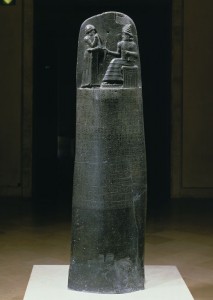 Cambridge University Akkadian grammar expert Martin Worthington has recorded spoken Babylonian, the language of Gilgamesh and Hammurabi, which faded out of usage 2000 years ago. We can’t be sure this is how Babylonian sounded, of course, but Worthington thinks they’ve gotten pretty close to the mark by comparing it to related languages that are still spoken.
Cambridge University Akkadian grammar expert Martin Worthington has recorded spoken Babylonian, the language of Gilgamesh and Hammurabi, which faded out of usage 2000 years ago. We can’t be sure this is how Babylonian sounded, of course, but Worthington thinks they’ve gotten pretty close to the mark by comparing it to related languages that are still spoken.
The Babylonian language, written on clay tablets in cuneiform script, dominated the Near East for centuries before it was gradually displaced by Aramaic. After a long decline, it disappeared from use altogether sometime in the first century A.D. — and was only deciphered nearly two millennia later by 19th-century European academics.
Worthington, who specializes in the study of Babylonian language and literature, said he got the idea of posting audio recordings of the ancient tongue to the Web because “the questions which students of ancient languages most frequently hear from laymen are: ‘How did they sound? And how do you know?'”
He said scholars have a pretty good idea of what Babylonian sounded like by comparing the language to its Semitic cousins — Hebrew and Arabic — and by picking out Babylonian words written in Greek or Aramaic. The vowel patterns within Babylonian itself also provide clues as to how some words are supposed to sound, he said.
The recordings range from different versions and chapters of the Epic of Gilgamesh, to excerpts from the Codex Hammurabi (the ancient law code from around 1790 B.C.), to a rather curious incantation meant to prevent dog bites.
The Ishtar poems, Ammiditana’s hymn to Ishtar and Ishtar’s Descent to the Netherworld, are both quite sexy, the first praising her hotness and the second lamenting its loss when she goes to hell. Versions of the former are read by two different experts, Karl Hecker and Doris Prechel. It’s interesting to compare the two and hear the differences in the readers’ accents and emphases.
You can listen to all 30 recordings read by a dozen experts and read along with both the cuneiform script and the English translation on Worthington’s website. Click the link to launch the audio file directly; click the book icon to the right of the link to see the written versions (there’s a link to the recording at the top of each page). More readings will be uploaded as they are recorded.